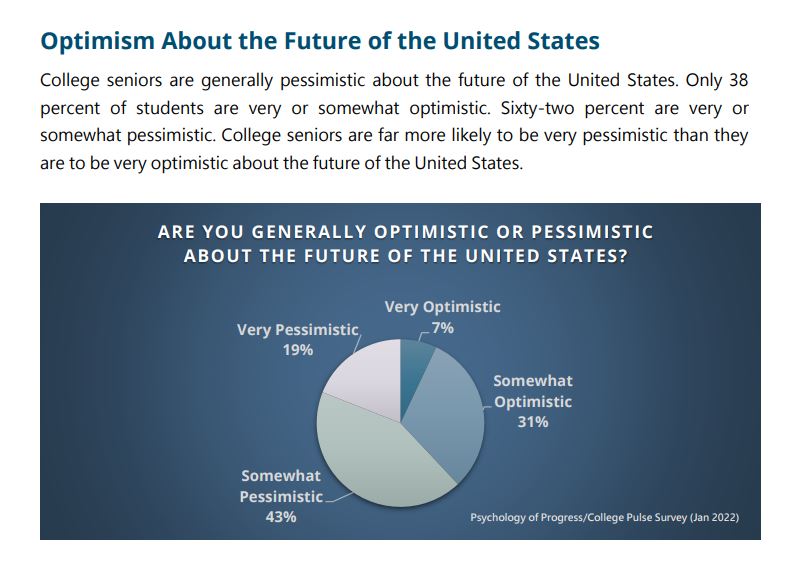
A recent survey of college seniors found that while they have faith in themselves, they are generally pessimistic about the future of the country, which could hinder their goals and accomplishments.
Titled “Thinking About the Future: Are College Seniors Optimistic,” the survey sought to measure the sentiments of college seniors’ personal confidence and outlook on societal progress.
It found that while 83 percent are optimistic regarding their individual prospects, 62 percent are pessimistic about America’s future.
“Their attitudes as they enter the world outside of campus will influence not only their own futures but the future of society and the world,” said North Dakota State University business Professor Clay Routledge, who conducted the research, in an email to The College Fix.
The findings suggest that while graduating college seniors’ self-directed attitudes are fine and they generally feel good about their lives, “they don’t seem to be doing so well when you take a broader and more outward-focused view of wellbeing,” Routledge said.
“And this could ultimately undermine their own individual wellbeing because pessimism about the world could undermine the progress that supports freedom and flourishing. It isn’t enough to just believe in yourself.”

The survey was sponsored by Psychology of Progress, an initiative run through NDSU’s Challey Institute for Global Innovation and Growth.
The contrasting levels of personal and societal optimism is a key aspect highlighted by Routledge. A lack of societal optimism will cause people to disengage from the activities needed to make the world a better place, he told The Fix.
Professor Routledge said he believes the report is a cause for concern, but added “we also need to focus more on what is going right in America and how we can build on that.”
He points to other surveys showing that most Americans are proud of their country, believe they have a level of personal agency, and feel that they are making progress toward the American Dream.
Asked what role institutions of higher education play in instilling societal confidence, Routledge said that colleges “could be doing a lot more to educate students about the reality of progress and more broadly promoting a psychology of human agency.”
Moreover, he said developing viewpoint diversity in colleges is necessary to create what he describes as the “curious, creative, and tolerant” mindsets conducive for progress and a free society.
The report states that college seniors were sampled because they are key to the future of progress and sit at an inflection point as they transition from college to the workforce.
College seniors are more optimistic about their own future than they are about the future of the US and the world. They are most pessimistic about the future political health of America. Learn more about our survey and The Psychology of Progress here. https://t.co/MDXf8CIqR2
— Clay Routledge (@clayroutledge) February 28, 2022
Other findings included optimism regarding the future of the world at large, on which college seniors are divided 50/50 between pessimism and optimism.
The survey also explored feelings on several specific issues. Participants were asked if they think humankind will make progress on climate change, poverty, racism or bigotry, and political polarization.
On climate change, 53 percent answered “no,” humanity will not make progress, while 47 percent answered “yes,” progress will be made. For poverty, the split was 60 percent “no” and 40 percent “yes.”
Regarding racism and bigotry, it was 37 percent “no” and 63 percent “yes.” Political polarization came in at 78 percent and 22 percent, respectively.
“As far as attitudes about specific issues relevant to human progress, college seniors are generally pessimistic. The majority do not think that in their lifetime humans will make significant progress on climate change, poverty, or political polarization,” the conclusion states.
“However, college students are more optimistic about progress on racism and other forms of bigotry; more than 60 percent think humans will make significant progress on this issue.”
“The survey suggests that college seniors are most pessimistic about the political health of America,” the survey stated. “Over 60 percent are pessimistic about the future of the United States and 80 percent do not think that in their lifetime there will be significant progress made on the problem of political polarization.”
The Psychology of Progress research was conducted with the College Pulse survey group and used a representative sample of 500 college seniors. The findings have a margin of error of plus or minus 5 percent.
Psychology of Progress states on its website that individuals are increasingly disconnected, anxious, and hopeless—all barriers to progress.
By using the lessons of psychology, Psychology of Progress members state they hope to understand such problems and promote a society conducive to growth: “to make the world a better place, people must want the world to be a better place, believe it can be a better place, and view themselves as agents of progress.”
MORE: Overwhelming majority of college students say shouting down a speaker is acceptable: survey
Like The College Fix on Facebook / Follow us on Twitter






Please join the conversation about our stories on Facebook, Twitter, Instagram, Reddit, MeWe, Rumble, Gab, Minds and Gettr.